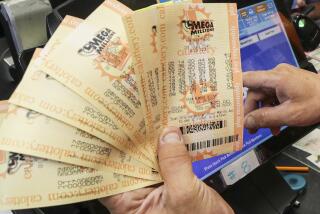It’s a Whole Lotto Money
- Share via
Is it better to take the reduced lump sum and invest or play it safe with 26 equal yearly payments? Pure math says the lump sum is better, because if invested wisely it will quickly grow back to the full amount and above. But we all know that spendthrift human nature can turn good investment to dust.
What’s going on here? An International Monetary Fund bailout? A jumbo mortgage escrow meeting? Nope. Just chitchat in the growing lines at Lotto machines as today’s deadline for hitting the jackpot nears. The pot, California’s largest since a record $114 million in 1991, stood at $80 million late Tuesday.
Whether to take a lump sum or a 26-year payout must be decided when buying a ticket, a smart marketing decision on the part of the California Lottery. It makes players think about how they’ll spend their winnings rather than the long odds on winning. Other debates include how to fend off greedy relatives and whether to allow a share of the jackpot to folks who aren’t paid up in the office pool.
If the awareness level in the gubernatorial campaign was 1/10th that of the lottery, we’d be vying with ancient Greece for civic involvement. If understanding of infrastructure spending could approach the sophistication of the lump-sum-versus-26-payments debate, California would have the best roads, bridges and sewers on Earth. But nothing about government approaches the fantasy value of an $80-million personal payoff.
There’s even a math geek rationale for the influx of players when the pot gets huge. When the jackpot is above $18 million, a calculation known as “expected value” balances the $18-million prize against the 18-million-to-1 odds of winning and says that a $1 investment now makes some mathematical sense if not personal budgetary sense. Of course, as the jackpot gets bigger and more people play, the number of possible winners grows--the flaw in this calculation.
Those who really understand 18-million-to-1 odds may find better uses for their money. Instead of two $5 Quick Pick tickets a week, they take $45 a month and invest it at an 8% return; in 15 years they have close to $16,000. But that won’t buy a life of luxury in Tahiti. Or endow an orphanage, the spending plan of one player who talked to The Times this week.
Compared to the damage caused by casino gambling, the California Lottery looks pretty tame. We don’t hear of addiction leading to fiscal ruin or suicide among Lotto players. State-run lotteries are not putting millions of dollars into politics, as casino owners are, to fend off government regulation. Last year, Lotto and its associated games took in more than $2 billion and returned $757 million to public education, though whether this money merely allows reductions in other school funding is a subject of argument.
The really basic question, whether morally the state should be involved in gambling, remains open, but the morality of five bucks off the top on payday, even at terrible odds, seems pretty low on the sin scale, and, heaven knows, the choice is yours alone.
More to Read
Inside the business of entertainment
The Wide Shot brings you news, analysis and insights on everything from streaming wars to production — and what it all means for the future.
You may occasionally receive promotional content from the Los Angeles Times.










